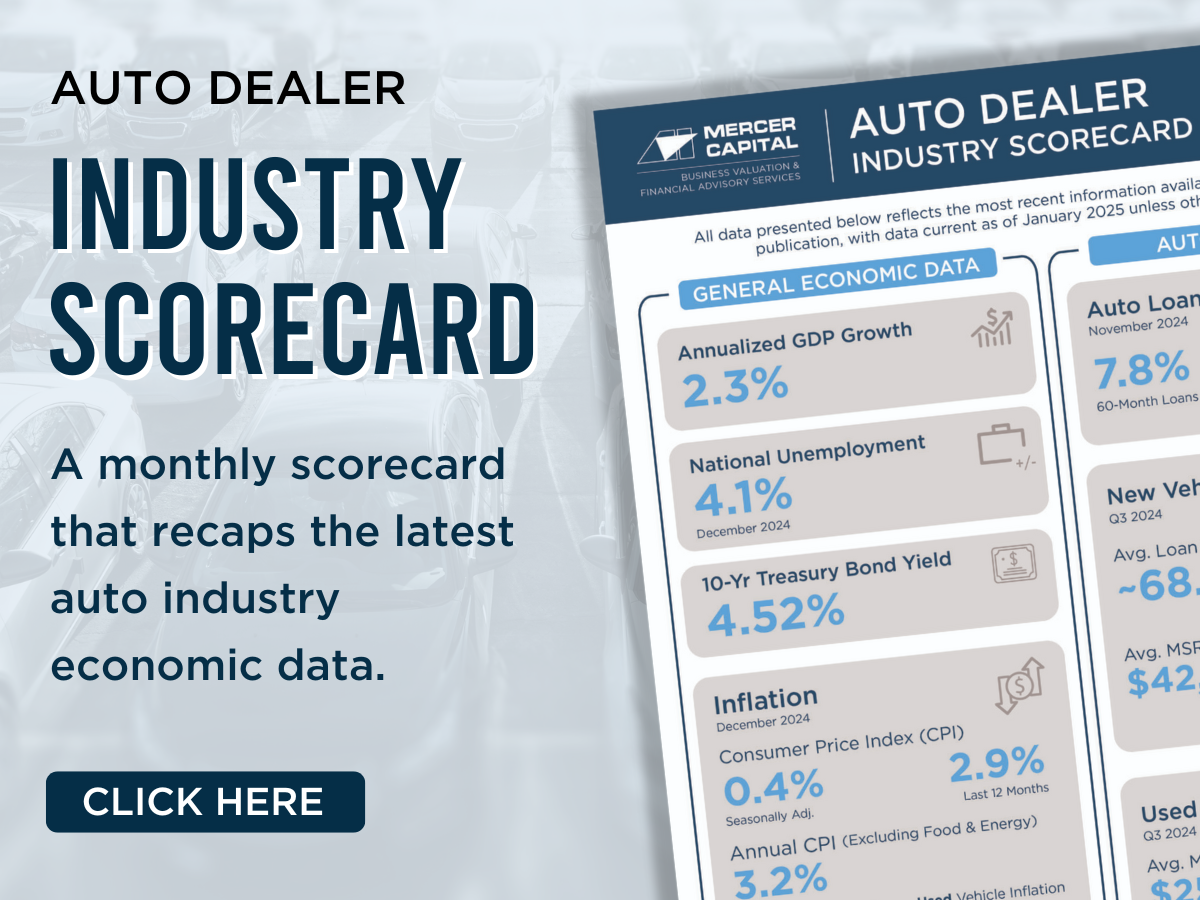Meet the Team
Harrison Holt
In each “Meet the Team” segment, we highlight a different professional on our Auto Dealer Industry team. This week we highlight Harrison Holt, Financial Analyst.
Harrison Holt began his valuation career at Mercer Capital as an intern in the summer of 2019. After finishing his degree at Rhodes College in 2020, Harrison joined Mercer Capital as a financial analyst in the Memphis office. In 2022, he moved to Mercer Capital’s Nashville office.
What influenced you to pursue a career at Mercer Capital?
Harrison Holt: I have always been very intrigued and excited by math, problem-solving, and storytelling. Luckily for me, valuation work is the intersection of the underlying story behind a business’s performance and the value indications that established financial models imply for that business. These two forces have to reconcile with one another, and I really enjoy telling the stories of numerous businesses through my valuation work.
Each valuation engagement is unique and offers many specific research and learning opportunities. My work with auto dealerships has been the most rewarding, as I have the opportunity to consistently study the auto dealer industry for market insights that pertain to various valuations.
Location is also a huge benefit of working for Mercer Capital. As a native Tennessean hailing from Jackson, starting my career in West Tennessee was a great way to stay close to family and challenge myself professionally. After my recent move from the Memphis office to the Nashville office, I feel grateful that I can do the type of work that I love in a part of the country that I love.
What types of auto engagements have you worked on?
Harrison Holt: There are many reasons an auto dealership would need a valuation from Mercer. For example, divorce proceedings, estate planning, and buy-sell issues are a few of the reasons why an auto dealership has crossed my desk. In my valuation work, I have valued dealer operations, entities that own the underlying dealership real estate, and powersports dealerships.
Tell me about any interesting takeaways from your experience writing the monthly SAAR blog.
Harrison Holt: Starting my career at the beginning of the COVID-19 pandemic came with its fair share of challenges, and this was especially true for the automotive industry.
I have followed the monthly Bureau of Economic Analysis (BEA) SAAR data releases for two consecutive years now. When I first started studying the SAAR, I became very comfortable with the data set as a whole. I started by reviewing the industry’s history so that I could draw relevant conclusions about where automotive retail stands today.
As most of our readers know, the last two years have been a roller coaster for auto dealers and the broader economy. When I first began covering the industry, high inventory volumes and low selling activity were the auto dealerships’ challenges. Mere months later, low inventory balances and red-hot demand pushed sticker prices and profitability through the roof. Supply chain issues, pent-up demand, and a volatile affordability environment have made following the industry exciting. While it’s been challenging to keep up, I am grateful that it’s an intriguing story to tell.
What has surprised you the most about valuing auto dealerships compared to businesses in other industries?
Harrison Holt: From time to time, I have found myself asking questions like “How can a dealership with only twenty units on the lot sustain record profitability over so many consecutive months?” and “Does it make sense to sell this dealership at elevated earnings and elevated blue sky multiples when the business itself is a premier cash flowing asset?”.
These questions come from observing the situation in which most of our clients find themselves. It has been nice to see how well these clients are doing, especially when many other industries are struggling to adapt to a rapidly changing economic environment. While client success is always good to see, valuing auto dealerships in the current environment does not come without challenges.
One challenge I have encountered while valuing auto dealerships has been estimating ongoing performance, which is a crucial step in the valuation process. Dealership performance over the past two years has been encouraging for our clients, but estimating the ongoing earning power of their dealerships into the future requires us to temper our expectations from currently elevated levels.
The industry as a whole has addressed this issue by changing the standard for calculating ongoing earnings used in deal pricing. Prior to the pandemic, trailing twelve-month earnings were the standard. Since then, industry participants such as Haig Partners have suggested multiple iterations of how to calculate ongoing earnings in an attempt to:
- Exclude the initially uncertain COVID-19 impact,
- Partially consider elevated earnings but place more weight pre-COVID performance, and
- Place more reliance on recent outperformance due to COVID and the chip shortage.
Now approaching three years since the pandemic began, it is increasingly difficult to derive a one-size-fits-all formula for how to determine ongoing earnings for all the 16,000+ dealerships across the country.
For more information about Mercer Capital’s Auto Dealership Team and our services to auto dealerships, click here.
 Auto Dealer Valuation Insights
Auto Dealer Valuation Insights 








